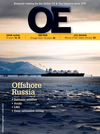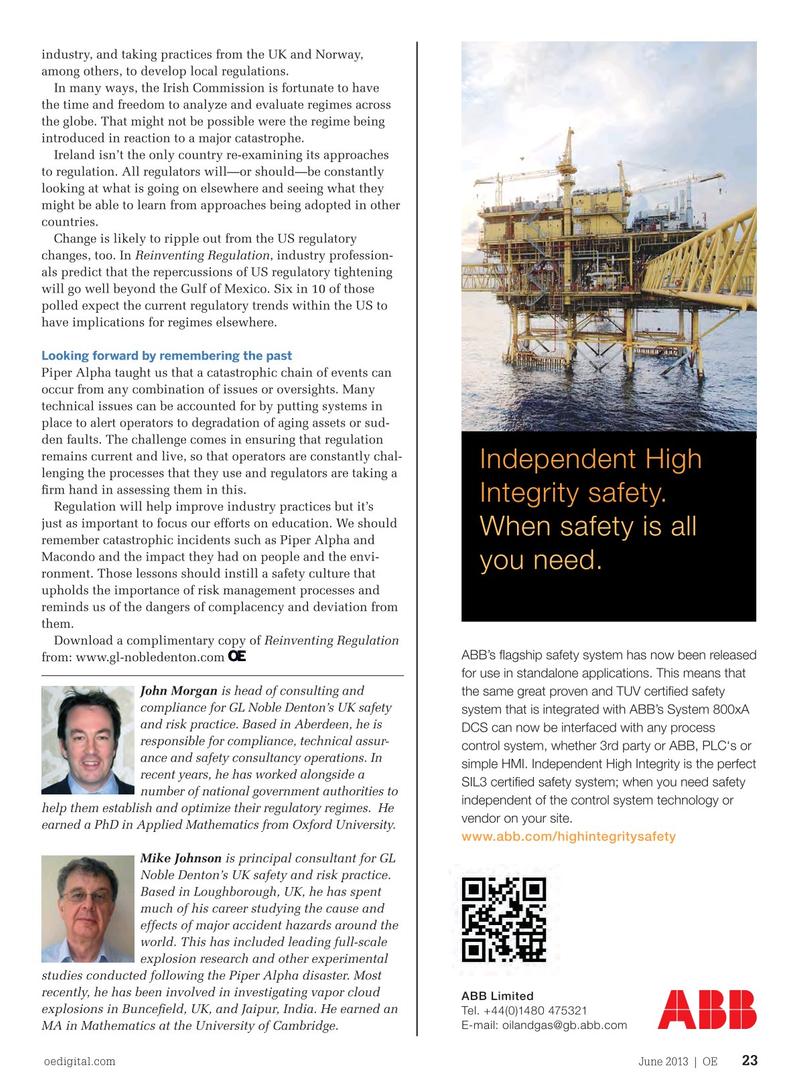
Page 21: of Offshore Engineer Magazine (Jun/Jul 2013)
Read this page in Pdf, Flash or Html5 edition of Jun/Jul 2013 Offshore Engineer Magazine
industry, and taking practices from the UK and Norway, among others, to develop local regulations.
In many ways, the Irish Commission is fortunate to have the time and freedom to analyze and evaluate regimes across the globe. That might not be possible were the regime being introduced in reaction to a major catastrophe.
Ireland isn’t the only country re-examining its approaches to regulation. All regulators will—or should—be constantly looking at what is going on elsewhere and seeing what they might be able to learn from approaches being adopted in other countries.
Change is likely to ripple out from the US regulatory changes, too. In Reinventing Regulation, industry profession- als predict that the repercussions of US regulatory tightening will go well beyond the Gulf of Mexico. Six in 10 of those polled expect the current regulatory trends within the US to have implications for regimes elsewhere.
Looking forward by remembering the past
Piper Alpha taught us that a catastrophic chain of events can occur from any combination of issues or oversights. Many technical issues can be accounted for by putting systems in place to alert operators to degradation of aging assets or sud- den faults. The challenge comes in ensuring that regulation remains current and live, so that operators are constantly chal-
Independent High lenging the processes that they use and regulators are taking a frm hand in assessing them in this.
Integrity safety.
Regulation will help improve industry practices but it’s just as important to focus our efforts on education. We should
When safety is all remember catastrophic incidents such as Piper Alpha and
Macondo and the impact they had on people and the envi- you need.
ronment. Those lessons should instill a safety culture that upholds the importance of risk management processes and reminds us of the dangers of complacency and deviation from them.
Download a complimentary copy of Reinventing Regulation
ABB’s fagship safety system has now been released from: www.gl-nobledenton.com for use in standalone applications. This means that
John Morgan is head of consulting and the same great proven and TUV certifed safety compliance for GL Noble Denton’s UK safety system that is integrated with ABB’s System 800xA and risk practice. Based in Aberdeen, he is
DCS can now be interfaced with any process responsible for compliance, technical assur- control system, whether 3rd party or ABB, PLC‘s or ance and safety consultancy operations. In simple HMI. Independent High Integrity is the perfect recent years, he has worked alongside a
SIL3 certifed safety system; when you need safety number of national government authorities to independent of the control system technology or help them establish and optimize their regulatory regimes. He vendor on your site. earned a PhD in Applied Mathematics from Oxford University. www.abb.com/highintegritysafety
Mike Johnson is principal consultant for GL
Noble Denton’s UK safety and risk practice.
Based in Loughborough, UK, he has spent much of his career studying the cause and effects of major accident hazards around the world. This has included leading full-scale explosion research and other experimental studies conducted following the Piper Alpha disaster. Most recently, he has been involved in investigating vapor cloud
ABB Limited explosions in Buncefeld, UK, and Jaipur, India. He earned an
Tel. +44(0)1480 475321
E-mail: [email protected]
MA in Mathematics at the University of Cambridge.
oedigital.com June 2013 | OE 23 006OE_0613Analysis_Qstats.indd 23 5/25/13 12:30 AM

 20
20

 22
22